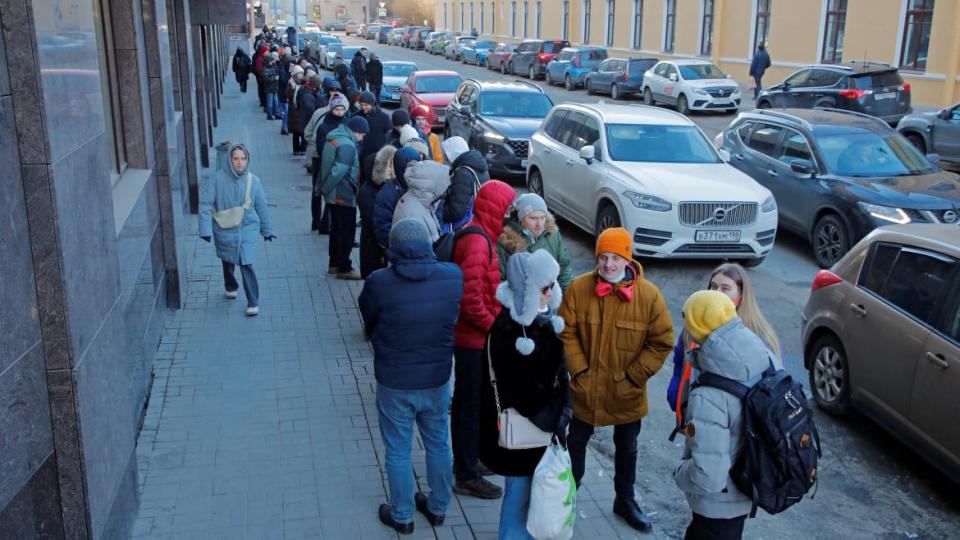Desperate Russians Race to Withdraw Cash as Sanctions Send Currency Into Free-Fall
- Oops!Something went wrong.Please try again later.

Russian President Vladimir Putin had every right to think that the threat of sanctions if he invaded Ukraine would fall flat. After all, when his troops stormed in to annex Crimea in 2014, the European Union limited some of Russia’s financial dealings—which ended up costing Europe as much as it did the Russian economy, and over time actually deepened the continent’s dependence on Russian gas and other exports.
Putin undoubtedly thought Russia’s tentacles in the European economy were too deep to sever.
But all that is quickly changing after the European Union started putting pressure on the usual holdouts, including Germany, which wanted to exempt gas from the list of sanctions; Italy, which wanted to exempt luxury goods; and Hungary, which didn’t agree with sanctions at all. With the EU now in full alignment over the most painful sanction of all—the removal of Russia from the SWIFT international currency network—Putin is feeling the pain.
On Monday, the first day of trading since the fresh sanctions took hold, the Russian economy was in free-fall, made worse by the U.S. Treasury announcing early Monday it would cut off Russia’s Central Bank, announcing on its website: “This action effectively immobilizes any assets of the Central Bank of the Russian Federation held in the United States or by U.S. persons, wherever located.”
The Russian ruble fell 30 percent against the U.S. dollar to an all-time record low and Moscow hiked interest rates to an emergency 20 percent level.
Russia’s central bank chose not to open trading at the Moscow exchange on Monday morning to try to stall the selloff. “Due to the current situation, we have decided not to open a stock market section, a derivatives market section, or a special derivatives market section on the Moscow Exchange today,” the bank said, according to media reports.
As Russians lined up at ATMs across the country out of fear that cash could be in short supply, Russia’s Central Bank appealed for calm. That fell on deaf ears, despite Kremlin promises that it has “the necessary resources and tools to maintain financial stability and ensure the operational continuity of the financial sector.”
A run on Russian banks may already be underway. “This weekend’s events now mean that no G7 banks will be able to buy Russian rubles, sending the currency into free-fall, with the end result we could see a huge inflationary shock unfold inside Russia,” Michael Hewson, of CMC Markets UK, told CNN. “A run on Russian banks inside the country appears to be already starting, as ordinary Russians fear that their credit cards might no longer work.”
Considering Russia’s war is just five days old, things are likely to only get worse. “It looks like Russia is increasingly becoming an economic pariah, increasingly isolated from the global financial system,” Will Walker-Arnott, senior investment manager at Charles Stanley, told the BBC.
The collateral damage extends far beyond the oligarchs, whose European properties are now being sequestered. Entities as far apart as Russian models on OnlyFans and Russia’s World Cup soccer team are feeling the pinch. So are Russian airlines, which are now prohibited from flying over much of Europe’s airspace. Flights to Russia from Europe were canceled out of fear that sanctions prohibiting the sale of aircraft parts to Russia would mean Putin might impound a few jets for spare parts. KLM even turned around two passenger jets in mid-air out of fear they wouldn’t return.
The economic collapse will have a devastating effect on ordinary Russian citizens who have very little hope of being able to force Putin from office.
And it will only get worse. Norway announced it will remove Russian investments from its lucrative $1.3 trillion sovereign wealth fund and Moody’s said it will likely downgrade Russian bonds to “junk” following a similar move by S&P. European Commission President Ursula von der Leyen said in a statement Sunday that the worst may be yet to come. “We will also ban the transactions of Russia’s central bank and freeze all its assets, to prevent it from financing Putin’s war,” she said.
Get the Daily Beast's biggest scoops and scandals delivered right to your inbox. Sign up now.
Stay informed and gain unlimited access to the Daily Beast's unmatched reporting. Subscribe now.

